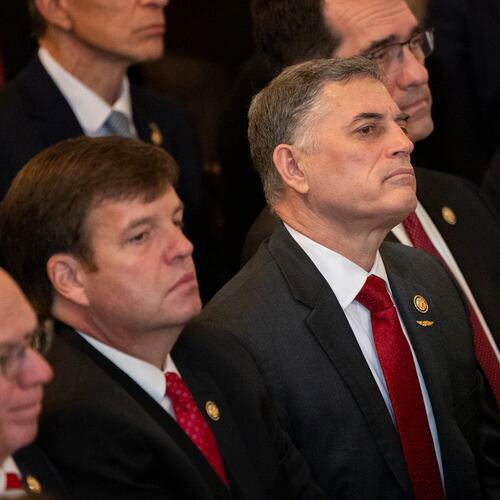WASHINGTON — After a trip to the White House and closed-door negotiations with Republican leaders, U.S. Rep. Andrew Clyde logged two key wins in the reconciliation package.
The changes were enough to earn the vote of Clyde and other initial GOP holdouts, who voted with all but three members of their party in favor of the package. The “big, beautiful bill” that contains many priorities of President Donald Trump passed Thursday morning on the House floor and now heads to the Senate.
An updated version of the bill unveiled Wednesday night included language championed by Clyde to repeal a $200 tax on the purchase of gun silencers. Clyde, who owns gun stores in Georgia, said he lobbied Speaker Mike Johnson to add this provision, which he says reinforces the importance of the Second Amendment by removing taxation that limits its reach.
“My Democrat colleagues have asked how did it get in the bill, what was in the deal and who asked for it?” Clyde, R-Athens, said during debate. “No deal. I believe the speaker with the purest of motives wanted to restore a constitutional right. Who asked? Me, I asked.”
Clyde and other hard-liners also successfully pushed for new work requirements for Medicaid recipients to be implemented in 2026 instead of 2029, which will cut costs sooner.
And to ensure the support of GOP lawmakers in states with higher taxes, the Wednesday changes also included an increase in the state and local tax, or SALT, deduction.
The bill passed on a vote of 215-214. Every Republican except three voted in favor. Kentucky’s Thomas Massie and Ohio’s Warren Davidson voted “no” with Democrats. Maryland Rep. Andy Harris voted “present.”
U.S. Reps. Buddy Carter, R-St. Simons Island, and Mike Collins, R-Jackson, were among the Republicans who spoke in favor of the bill ahead of the vote. Carter is a candidate for the U.S. Senate, and Collins is considering whether to run.
Collins cited language making permanent tax cuts passed in 2017 during Trump’s first term as a reason for his support of the bill.
“You see, it doesn’t matter if you have two college degrees, no college degrees, brown, Black, white: Trump’s policies lifted all boats,” Collins said. “That’s why I encourage my colleagues to join me, pass this bill and vote for main street.”
Carter, who is a member of the committee that initially signed off on massive changes to Medicaid that could result in millions losing coverage if the bill becomes law, said the changes are necessary to ensure the longevity of the health care program for the poor and disabled.
“Passing this bill means preserving Medicaid for generations to come and keeping our promise to ensure it’s there for Americans who truly need it,” he said.
The bill can pass in both chambers without the support of Democrats, whose main role was not in negotiating the contents but in pointing out the impact of reducing spending on Medicaid, Medicare and the Supplemental Nutrition Assistance Program, or SNAP.
“The biggest cut to SNAP in history, the biggest cut to Medicaid and Medicare in history, along with the biggest tax cut to the top billionaires in this country, the top 1%,” said U.S. Rep. Hank Johnson, D-Lithonia. “It’s really ruinous for this country should that legislation see the light of day and get signed into law.”
How members of Georgia’s U.S. House delegation voted on the reconciliation bill, H.R. 1
“Yes”
U.S. Rep. Rick Allen, R-Augusta
U.S. Rep. Buddy Carter, R-St. Simons Island
U.S. Rep. Andrew Clyde, R-Athens
U.S. Rep. Mike Collins, R-Jackson
U.S. Rep. Marjorie Taylor Greene, R-Rome
U.S. Rep. Brian Jack, R-Peachtree City
U.S. Rep. Barry Loudermilk, R-Cassville
U.S. Rep. Rich McCormick, R-Suwanee
U.S. Rep. Austin Scott, R-Tifton
“No”
U.S. Rep. Sanford Bishop, D-Albany
U.S. Rep. Hank Johnson, D-Lithonia
U.S. Rep. Lucy McBath, D-Marietta
U.S. Rep. David Scott, D-Atlanta
U.S. Rep. Nikema Williams, D-Atlanta
About the Author
Keep Reading
The Latest
Featured



